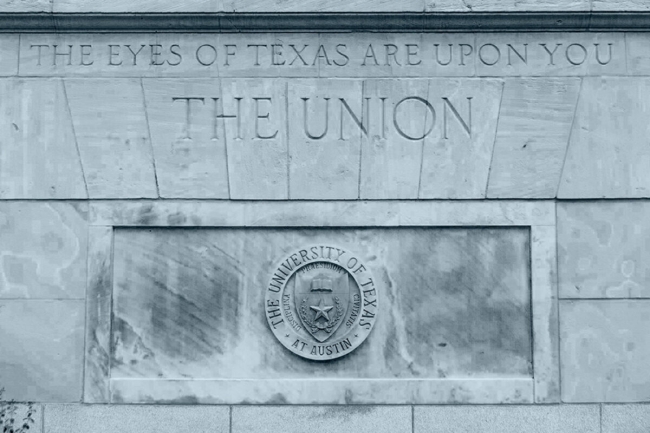You have /5 articles left.
Sign up for a free account or log in.

The University of Texas at Austin released a report Tuesday saying its controversial alma mater, "The Eyes of Texas," was not originally intended to be racist.
Courtesy of the University of Texas at Austin
The University of Texas at Austin released a highly anticipated report Tuesday about the history of “The Eyes of Texas,” its alma mater, largely contradicting claims that the song was created with racist intent and justifying the university’s decision to retain the song.
While some observers applauded the university's effort to deeply analyze the song's history, others questioned why the research needed to be done in the first place. Many students, faculty members and alumni upset with the report's conclusions felt it overshadowed the offense that people of color on campus currently feel because of the song, which they believe should take priority over whether it was intended to be racist.
The university convened a group of 23 students, athletes, alumni, administrators, faculty members and other current and former staff members who in October began to dissect the creation of the song and its use at UT Austin for 120 years. The song first debuted at a minstrel show organized in 1903 by students, who the committee suspects wore blackface while performing, according to the report, which is posted on a university website.
This “is a painful reality of the song’s origin” and made committee members uncomfortable, the report said.
But the song’s lyrics and meaning were not originally intended to be racist, the report said. The committee could not find evidence that the line “the eyes of Texas are upon you” is derivative of “the eyes of the South are upon you,” a statement believed to be made by Robert E. Lee, the Confederate general.
The committee could not find a primary source linking the phrase to Lee in records it sought from Washington & Lee University, where he was president, said Richard Reddick, associate dean for equity, community engagement and outreach for the College of Education at UT Austin and chair of the committee. Though the context in which the song was created was racist, the song itself could not be proven to be intentionally so, Reddick said during a Tuesday videoconference call with reporters.
“It's undeniable that the environment, the circumstances -- Jim Crow, post-Antebellum Texas in 1903 -- are inherently racist, and the absence of Black people and people of color generally in the centrality of campus life was problematic,” Reddick said. “There is not absolution nor is there vindication. This is a complicated story.”
Students, led by athletes on the Longhorns football team, began a movement in June to replace the song, which student leaders said was racially offensive. Hundreds of students urged UT Austin administrators to stop the use of the song rather than “reclaim and redefine” its meaning and continue playing it as the university’s alma mater -- an idea President Jay Hartzell proposed last summer.
The song is traditionally played after home football games at Texas Memorial Stadium, when athletes and fans will join in singing it. This past season, some football players said they felt uncomfortable singing "The Eyes" but allegedly were pressured to remain on the field for the song by athletics officials who referenced emails from unhappy wealthy university donors, The Texas Tribune reported. The university's athletic director has denied that players were forced to stay on the field.
“I understand the value of tradition and the power it brings, but some things aren’t worth preserving,” one student said in a video circulated in September by Rewrite Not Reclaim, a group of UT Austin student activists attempting to change the alma mater. The group did not respond to a request for comment Tuesday.
Hartzell announced his decision to keep the song months before the committee was convened to examine its history. When the university’s marching band found some members unwilling to play the song, Hartzell doubled down and said it would be played at future games.
In a message to students, faculty and staff members about the committee report, Hartzell said he hopes "The Eyes" can be appreciated by the UT Austin community for its intended meaning as a “song of accountability that has been used to bring Longhorns closer together.” The intent of the song and the words of a past UT Austin president who used the phrase “the eyes of Texas are upon you” were to convey to the student body that “the elders of the state and the previous generation are watching them and expecting them to do great things with their education,” the history committee found.
“I truly believe ‘The Eyes of Texas’ can again be a force for accountability and unity among our students, faculty, staff and alumni,” Hartzell’s message said. “Our song started out as a request for students to do the right things at all times to protect a fledgling university from risking its future. Over time, it was sung by an increasingly diverse community of students and scholars, becoming a rallying cry for excellence as our university matured and grew into the true flagship of our state.”
However, some students and alumni who reacted to the report on Twitter questioned its motives and results. They viewed it as a way for the university to explain away the song’s ties with racism.
The institution should support athletes’ and others students’ stances on the issue, rather than prioritizing the continuation of the university’s alma mater, said Anne Lewis, a professor of practice in the university's Department of Radio-Television-Film and executive board member of the Texas State Employees Union, which represents employees at UT Austin. Students of color deserve backup from the institution more than a song that is mostly used at sports games, said Lewis, who was involved in and supported the removal of a statue of Confederate president Jefferson Davis from campus.
“The relationship of student athletes to this is more of a priority, more than what Robert E. Lee actually said,” Lewis said. “I think we have to support our students, and they weren’t equivocating. Why are we?”
Ivory Toldson, a professor of counseling psychology at Howard University and editor in chief of The Journal of Negro Education, said despite UT Austin’s best efforts to retell the song’s history and focus on positive situations in which it was used, students of color who are offended by "The Eyes" and see it as racist won’t easily have their minds changed by the report.
The report highlights instances when the song was sung by UT Austin students protesting in favor of civil rights, such as when students marched in 1944 in support of a past university president who allegedly wanted to integrate the university. Focusing on these uses of the song might prompt a “less visceral reaction” to the song from today’s students and alumni, but it doesn’t change how they feel when they hear it, Toldson said.
“Absent some of the pointedly racist things like being connected to Robert E. Lee, there’s a problem with the broader population of students feeling like the song doesn’t represent them,” Toldson said. “It was created during a time when the university was excluding them, and it was created for them to enjoy. That’s not going to change with the findings of the report.”
Kyanna Richard, a senior at UT Austin who is a member of the historical committee and internal affairs chair of Longhorn Blacks, a group for Black marching band students, supported the university's Black football players who brought attention to the issue. She still supports students who want to protest "The Eyes," she said.
But Richard said it was encouraging and empowering to learn that the song was used in protest by students and other people of color in the past. She believes that discussions about the use of the song -- especially on social media -- have not been constructive. Both sides of the debate have distracted from the primary goal of making UT Austin a more diverse and inclusive institution for students of color, she said.
“If you really delve into this information, you won’t come out on one side or another. You’ll find that there are both positives and negatives on this,” Richard said of report. “The truth is out there and you should decide what’s right for you … I want people to do what they feel is best for them. Protest the song, or not protest the song and sing it confidently.”
Richard said more attention should be directed at 40 recommendations that the historical committee laid out for university administrators, including a suggestion to remove fans from Longhorns games if they use “hateful, racially directed language” and to recognize the history of "The Eyes" in new student orientation and in a short video before football games and other sports contests.
“Let’s get this change going,” she said. “It’s not just about the song; it’s about what we do as an institution to make this place more accepting for students of color, Black faculty, Black staff. Make it more inclusive for all.”








